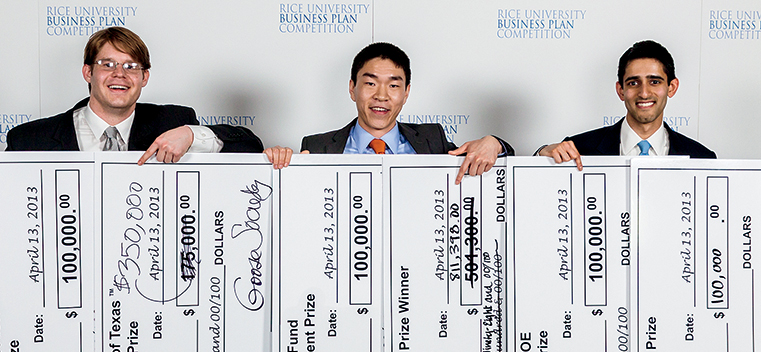
Clean-Energy Student Startup Charges Ahead
Tell us what you think. E-mail comments or questions to the editors at letters@northwestern.edu.
Ever wonder about those strange designations we use throughout Northwestern to identify alumni of the various schools of the University? See the complete list.
Find Us on Social Media
Northwestern-based SiNode Systems wins big at business competitions with plan for better batteries.
A student-run company founded at Northwestern and focused on building a better battery has put a real charge into the clean-tech business world.
SiNode Systems, which is developing next-generation lithium-ion batteries, won more than $1 million in business plan competitions, including the top prize at this year’s Rice Business Plan Competition, the world’s largest and richest competition of its kind. SiNode Systems also won the U.S. Department of Energy’s National Clean Energy Business Plan Competition, one year after Northwestern’s NuMat Technologies took the title in 2012.
SiNode Systems started a year ago during NUvention: Energy, an entrepreneurship course where Samir Mayekar (WCAS06), a Kellogg School of Management student, and his classmates created business plans for energy technologies developed at Northwestern. SiNode Systems uses technology invented and developed by chemical and biological engineering professor Harold Kung. The company’s innovative anode enables batteries to last for days and charge in minutes, which could revolutionize industries ranging from electric vehicles to consumer electronics.
After the NUvention class ended, Mayekar and his team worked with engineering doctoral candidate Cary Hayner, now SiNode System’s chief technology officer, to take the company beyond Northwestern.
SiNode Systems’ technology was four years in the making, says Hayner. Researchers know that silicon is a good material for batteries because it holds far more energy than current materials, he explains. However, the high energy also damages the silicon, reducing the battery’s lifespan. When the researchers began seeking a better battery in 2009, graphene, a one-atom-thick lattice of carbon, had just become a hot item, and they found that graphene could stabilize the silicon in a high-capacity battery.
Mayekar, SiNode Systems’ CEO and former national security director in the White House’s Presidential Personnel Office (see “The White House Goes Purple,” summer 2010), says his work with materials scientists and engineers, as well as fellow Kellogg students, exemplifies the interdisciplinary approach that Northwestern President Morton Schapiro champions. “There’s no better experience than what we’ve done,” says Mayekar, “where you have students from the business school and students from the engineering school collaborating. That is the secret sauce of Northwestern.”



 Facebook
Facebook Twitter
Twitter Email
Email


